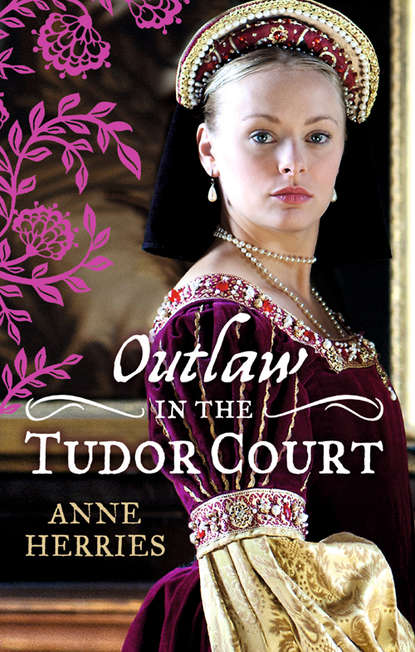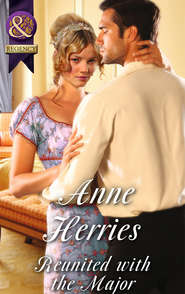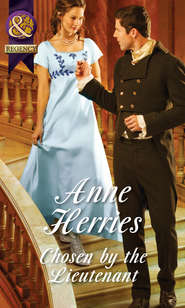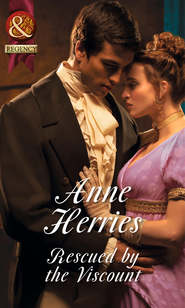По всем вопросам обращайтесь на: info@litportal.ru
(©) 2003-2024.
✖
OUTLAW in the Tudor Court: Ransom Bride / The Pirate's Willing Captive
Настройки чтения
Размер шрифта
Высота строк
Поля
OUTLAW in the Tudor Court: Ransom Bride / The Pirate's Willing Captive
Anne Herries
RANSOM BRIDEOnce a galley slave, now a Venetian merchant prince, Lorenzo Santorini has sworn revenge on his captor and has no time for women. English beauty Kathryn Rowlands appeals for help infinding a friend lost to pirates and then Lorenzo struggles to maintain his cool detachment. For Kathryn stirs deep feelings he had long forgotten and now he must take drastic steps to protecther from his sworn enemy…THE PIRATE'S WILLING CAPTIVEHeld captive on the high seas by pirate Captain Justin Sylvester, with nowhere to run, Maribel Sanchez had never felt more at liberty. For if she returned to rigid Tudor society she’d become an old man’s unwilling bride. If she remained with Justin, he’d made it abundantly clear, she would become his more than willing mistress!
Outlaw in the Tudor Court
Ransom Bride
The Pirate’s Willing Captive
Anne Herries
www.millsandboon.co.uk (http://www.millsandboon.co.uk)
ANNE HERRIES lives in Cambridgeshire, where she is fond of watching wildlife and spoils the birds and squirrels that are frequent visitors to her garden. Anne loves to write about the beauty of nature and sometimes puts a little into her books, although they are mostly about love and romance. She writes for her own enjoyment and to give pleasure to her readers. She is a winner of the Romantic Novelists’ Association Romance Prize.
Ransom Bride
Contents
Chapter One
Chapter Two
Chapter Three
Chapter Four
Chapter Five
Chapter Six
Chapter Seven
Chapter Eight
Chapter Nine
Chapter Ten
Chapter Eleven
Chapter Twelve
Chapter Thirteen
Chapter One
Kathryn stood at the top of the cliff, looking down at the sea as it swirled about the rocks far below her. The wind tore at her hair, catching at her cloak, buffeting her from all sides as she stared out to the far horizon, her thoughts returning as always when she came here to that day in her childhood—the day when the bravery of her companion had saved her life. Never would she forget how they had gone down to the cove in direct disobedience to their fathers’ commands; how their curiosity about the strange ship in the bay had brought disaster.
Kathryn’s cheeks were wet as she wiped the tears with the back of her hand. There was no point in weeping. Dickon had gone from her, from his family, taken by the Corsairs who had come ashore to find water and food. It seemed that some of the villagers had been trading with these evil men who plagued the seas of the Mediterranean and occasionally ventured as far as the coasts of England and Cornwall. How often she had regretted that she had not been more mindful of her duty, for it was she who had prompted her companion to go down and investigate the strange ship.
Shivering, Kathryn recalled the way the fierce pirates had suddenly swooped on them as they walked innocently towards where the pirates were plying their trade with the rogue villager. That man had long disappeared from the village, for when Kathryn escaped from the clutches of the men who had tried to seize her, he must have known she would tell her story. But her beloved Dickon had not escaped. He had pushed her behind him, telling her to run for help while he had bravely fought against the men who attacked them. At the top of the cliff, she had stopped, turning to see that they were carrying Dickon on board the boat that had brought them ashore, and that he appeared to be unconscious.
Kathryn had run as fast as she could to her father’s house, spilling out her tale of abduction and treachery, but when the party of men had arrived at the beach it was to find it empty, with no sign of the brave lad who had fought against impossible odds. He was but fifteen when they took him, but Kathryn knew he would have been sold as a slave, perhaps to work in the kitchens of some eastern potentate. Or perhaps, because he was tall and strong for his age, he had been chained to an oar in one of the raiders’ galleys.
She had wept bitter tears, for she had loved Dickon. He was her friend and her soulmate and, though their families lived some leagues distant from one another, they had known each other well. Kathryn believed that it was the intention of both fathers that they should marry one day, when she was nineteen. She was almost nineteen now and soon her father would make arrangements for her to marry someone else. But in her heart she belonged to Richard Mountfitchet—her own Dickon.
‘Dickon…’ Kathryn whispered, her words whipped away by the wind, drowned by the cries of seabirds and the crashing of the waves against the rocky Cornish coastline. ‘Forgive me. I never thought it would happen. I did not know that such evil men existed until that day. I miss you. I still love you. I shall always love you.’
It was ten years to the day, Kathryn thought, and every year she came here at the same time hoping to see Dickon, praying that he might return to her and his family. Yet she knew it was impossible. How could he return? Their fathers had sent men to search the slave markets in Algiers. They had contacted friends in Cyprus, Venice and Constantinople, the city that the Turks now called Istanbul, but which was still known in the Christian world by its old name. Always, there was unrest between the Turks and the Christians; wars, quarrels, and differences of religion and culture made it difficult to conduct a search within the Ottoman Empire. For Sultan Selim II was constantly seeking to push out the boundaries of his empire and had boasted that one day he would stand victorious in Rome itself. However, there were a few men who could help and one of them was Suleiman Bakhar.
Suleiman had an English wife. He was a clever, educated man and travelled tirelessly, trading, trying to reach out to the world beyond the Ottoman Empire, and hoping to bring about peace, though there was such hatred, such a history of conflict between their peoples that it seemed the breach could not be bridged.
Kathryn knew that Suleiman Bakhar was in England at this time. He had promised to make inquiries on behalf of Lord Mountfitchet, but as far as she knew he had discovered nothing that could help them. Sir John Rowlands and Lord Mountfitchet had gone to London to speak with him, for they had other business of which Kathryn knew nothing, and it would suit them to meet with Suleiman at the same time. But they were expected to return today, and Kathryn felt a flicker of hope as she turned her steps towards the beautiful old manor house that was her home. It had once been fortified against attack from the sea, but, in these more peaceful times of Queen Elizabeth’s reign, it had become simply a family home rather than a fortress, with many improvements to make it more comfortable.
As she reached her home, she saw that a cumbersome travelling coach had pulled up in the courtyard and she began to run, her heart racing. Perhaps this time there would be news of Dickon…
Lorenzo Santorini stood on the steps of his palace. It was built at the edges of the Grand Canal, the huge lagoon that wound through the city and beneath the many bridges of Venice. The city had established trading arrangements with the Muslim world that had helped it to become one of the most powerful seagoing nations on earth a hundred years earlier. It was from here that the great Marco Polo had set out on his voyage of expedition that had taken him as far as the court of Kublai Khan, opening up the known world far beyond what it had been previously. However, the Turkish invasions and the unrest of recent years had led to gradual erosion of the Republic’s supremacy.
The Venetian galleys were, however, still thought to be some of the best craft available and remained a force to be reckoned with; the merchants of Venice were rich and influential—and Lorenzo Santorini was one of the most powerful amongst them. His galleys were famed for their speed, fighting abilities and the discipline of his men, none of whom were slaves.
He frowned as he saw the galley making its way towards the small jetty where he stood waiting. It was one of the fleet that he owned which guarded his merchant ships, and it was late returning from what should have been a routine trip to Cyprus to buy wine. As it drew closer, he could see that it had taken part in some fighting—which could only mean that it had been attacked by a Turkish or Corsair galley.
‘Welcome back, Michael,’ Lorenzo said as the captain mounted the steps towards him. He extended his hand, helping him jump up to the steps of the palace. ‘I thought there must have been some trouble—was it Rachid again?’
‘Is it not always Rachid?’ Michael dei Ignacio replied with a grimace. ‘He hates us and will harry our vessels whenever he gets the chance. Fortunately, I had left Cyprus in company with three other galleys and the ship that carried your wine. We lost one of our fighting galleys, but the merchant ship is safe. It is but an hour behind me, accompanied by two galleys. We came ahead because we have several injured men on board.’
‘They must be tended by the physicians,’ Lorenzo said with a frown, ‘and all shall be compensated for the hurt they have suffered.’ In Lorenzo’s galleys the men were paid for their work, not chained to their oars the way the wretched prisoners were in the galleys of those men most feared in these waters. The Corsairs, or Barbary pirates, as some were wont to call them, roamed the seas from the Mediterranean and Adriatic to the Barbary Coast and the Atlantic. They were fearsome men who were a law unto themselves, owing no allegiance to anyone, though some paid tribute to the Ottoman Empire.
‘It shall be attended to,’ Michael promised. Lorenzo was a good master to work for, and a mystery to most, for few knew anything of his history. Michael himself knew that Lorenzo was the adopted son of the man whose name he bore; of much of what had gone before he was as ignorant as the next man.
‘I know I can leave their welfare in your hands,’ Lorenzo said. His eyes were the colour of violets, a dark blue and as unreadable as his thoughts. His hair, the colour of sun-ripened corn bleached white at the tips, was worn longer than the fashion of the time; thick and strong, it curled in his neck. ‘I leave for Rome in the morning. I have been summoned to a meeting concerning these pirates.’ His lip curled in scorn, for he included the Turks, who had caused the merchants of Venice so much trouble these past fifty years or so and now had the audacity to demand Cyprus of the Doge, something that would be fiercely resisted by the Venetians. ‘As you know, there is talk of gathering a force to curb Selim’s power, otherwise he will sweep further into Europe. The Emperor is concerned and he hopes to bring in Spain as well as other allies to break the power of the Turks.’
Michael nodded, for he knew that his friend was considered an important man by certain men of influence in the Holy Roman Empire. Lorenzo owned twenty fighting galleys besides his fleet of four merchant ships, and he would certainly be asked to join any force that attempted to sweep the menace of the Turkish invaders from the seas. There was a widely held belief that, could they but break the power of the Ottoman Empire, many of the Corsairs would lose much of their own power.
‘They need to be curbed,’ Michael agreed. ‘In the meantime, we have captured one of Rachid’s oarsmen. We sank one of his galleys and this man was brought out of the water, still chained to the wooden spar that prevented him from drowning. We shall see what information we can persuade him to give us about his master’s stronghold—’
‘I will not have him tortured,’ Lorenzo said. ‘No matter that he is a Turk and an enemy, he shall be treated as a man. If he is willing to help us, we shall offer him employment in our ranks. If he refuses to co-operate, we will see if he can be ransomed to his family.’
Lorenzo rubbed at one of the wide leather bands he habitually wore on his wrists, his eyes as dark as the deepest waters of the Mediterranean and as impenetrable.
‘I do not believe he is of Turkish origin,’ Michael said. ‘He will not answer when spoken to, though he understands the language of his masters, also some French and, I think, English.’
Lorenzo looked at him in silence for a moment. ‘This man is not to be ill treated,’ he said. ‘You will leave his questioning to me when I return, if you please, my friend. And now you must rest, enjoy the benefits of home and family for a few days. You have earned them. When I return from Rome we shall meet again.’
‘As you command,’ Michael said, watching as his friend signalled to a small gondola that was waiting to ferry him out to his personal galley, which was further out in the lagoon. He was curious as to why his commander had suddenly decided that he wanted to interrogate the prisoner himself, but he would obey his orders. The reason Michael, born of good family, had chosen to sail with Lorenzo Santorini was because he respected him; he was a fair man, not cruel—though he would not suffer disobedience lightly.
Lorenzo was thoughtful as he boarded the galley, which was the flagship of his fleet, the fastest and newest of the vessels he owned, with the benefit of three sails, to be used when the wind was fair, thus giving the oarsmen a chance to rest. Such galleys were still much faster and easier to manoeuvre than the top-heavy galleons the Spanish favoured. Even the smaller, lighter craft of the English merchant adventurers, who had begun to be a considerable force in these seas, would find it difficult to keep pace with this galley. Turkish galleys seldom attacked his ships—they knew that he was a man to be reckoned with.
Anne Herries
RANSOM BRIDEOnce a galley slave, now a Venetian merchant prince, Lorenzo Santorini has sworn revenge on his captor and has no time for women. English beauty Kathryn Rowlands appeals for help infinding a friend lost to pirates and then Lorenzo struggles to maintain his cool detachment. For Kathryn stirs deep feelings he had long forgotten and now he must take drastic steps to protecther from his sworn enemy…THE PIRATE'S WILLING CAPTIVEHeld captive on the high seas by pirate Captain Justin Sylvester, with nowhere to run, Maribel Sanchez had never felt more at liberty. For if she returned to rigid Tudor society she’d become an old man’s unwilling bride. If she remained with Justin, he’d made it abundantly clear, she would become his more than willing mistress!
Outlaw in the Tudor Court
Ransom Bride
The Pirate’s Willing Captive
Anne Herries
www.millsandboon.co.uk (http://www.millsandboon.co.uk)
ANNE HERRIES lives in Cambridgeshire, where she is fond of watching wildlife and spoils the birds and squirrels that are frequent visitors to her garden. Anne loves to write about the beauty of nature and sometimes puts a little into her books, although they are mostly about love and romance. She writes for her own enjoyment and to give pleasure to her readers. She is a winner of the Romantic Novelists’ Association Romance Prize.
Ransom Bride
Contents
Chapter One
Chapter Two
Chapter Three
Chapter Four
Chapter Five
Chapter Six
Chapter Seven
Chapter Eight
Chapter Nine
Chapter Ten
Chapter Eleven
Chapter Twelve
Chapter Thirteen
Chapter One
Kathryn stood at the top of the cliff, looking down at the sea as it swirled about the rocks far below her. The wind tore at her hair, catching at her cloak, buffeting her from all sides as she stared out to the far horizon, her thoughts returning as always when she came here to that day in her childhood—the day when the bravery of her companion had saved her life. Never would she forget how they had gone down to the cove in direct disobedience to their fathers’ commands; how their curiosity about the strange ship in the bay had brought disaster.
Kathryn’s cheeks were wet as she wiped the tears with the back of her hand. There was no point in weeping. Dickon had gone from her, from his family, taken by the Corsairs who had come ashore to find water and food. It seemed that some of the villagers had been trading with these evil men who plagued the seas of the Mediterranean and occasionally ventured as far as the coasts of England and Cornwall. How often she had regretted that she had not been more mindful of her duty, for it was she who had prompted her companion to go down and investigate the strange ship.
Shivering, Kathryn recalled the way the fierce pirates had suddenly swooped on them as they walked innocently towards where the pirates were plying their trade with the rogue villager. That man had long disappeared from the village, for when Kathryn escaped from the clutches of the men who had tried to seize her, he must have known she would tell her story. But her beloved Dickon had not escaped. He had pushed her behind him, telling her to run for help while he had bravely fought against the men who attacked them. At the top of the cliff, she had stopped, turning to see that they were carrying Dickon on board the boat that had brought them ashore, and that he appeared to be unconscious.
Kathryn had run as fast as she could to her father’s house, spilling out her tale of abduction and treachery, but when the party of men had arrived at the beach it was to find it empty, with no sign of the brave lad who had fought against impossible odds. He was but fifteen when they took him, but Kathryn knew he would have been sold as a slave, perhaps to work in the kitchens of some eastern potentate. Or perhaps, because he was tall and strong for his age, he had been chained to an oar in one of the raiders’ galleys.
She had wept bitter tears, for she had loved Dickon. He was her friend and her soulmate and, though their families lived some leagues distant from one another, they had known each other well. Kathryn believed that it was the intention of both fathers that they should marry one day, when she was nineteen. She was almost nineteen now and soon her father would make arrangements for her to marry someone else. But in her heart she belonged to Richard Mountfitchet—her own Dickon.
‘Dickon…’ Kathryn whispered, her words whipped away by the wind, drowned by the cries of seabirds and the crashing of the waves against the rocky Cornish coastline. ‘Forgive me. I never thought it would happen. I did not know that such evil men existed until that day. I miss you. I still love you. I shall always love you.’
It was ten years to the day, Kathryn thought, and every year she came here at the same time hoping to see Dickon, praying that he might return to her and his family. Yet she knew it was impossible. How could he return? Their fathers had sent men to search the slave markets in Algiers. They had contacted friends in Cyprus, Venice and Constantinople, the city that the Turks now called Istanbul, but which was still known in the Christian world by its old name. Always, there was unrest between the Turks and the Christians; wars, quarrels, and differences of religion and culture made it difficult to conduct a search within the Ottoman Empire. For Sultan Selim II was constantly seeking to push out the boundaries of his empire and had boasted that one day he would stand victorious in Rome itself. However, there were a few men who could help and one of them was Suleiman Bakhar.
Suleiman had an English wife. He was a clever, educated man and travelled tirelessly, trading, trying to reach out to the world beyond the Ottoman Empire, and hoping to bring about peace, though there was such hatred, such a history of conflict between their peoples that it seemed the breach could not be bridged.
Kathryn knew that Suleiman Bakhar was in England at this time. He had promised to make inquiries on behalf of Lord Mountfitchet, but as far as she knew he had discovered nothing that could help them. Sir John Rowlands and Lord Mountfitchet had gone to London to speak with him, for they had other business of which Kathryn knew nothing, and it would suit them to meet with Suleiman at the same time. But they were expected to return today, and Kathryn felt a flicker of hope as she turned her steps towards the beautiful old manor house that was her home. It had once been fortified against attack from the sea, but, in these more peaceful times of Queen Elizabeth’s reign, it had become simply a family home rather than a fortress, with many improvements to make it more comfortable.
As she reached her home, she saw that a cumbersome travelling coach had pulled up in the courtyard and she began to run, her heart racing. Perhaps this time there would be news of Dickon…
Lorenzo Santorini stood on the steps of his palace. It was built at the edges of the Grand Canal, the huge lagoon that wound through the city and beneath the many bridges of Venice. The city had established trading arrangements with the Muslim world that had helped it to become one of the most powerful seagoing nations on earth a hundred years earlier. It was from here that the great Marco Polo had set out on his voyage of expedition that had taken him as far as the court of Kublai Khan, opening up the known world far beyond what it had been previously. However, the Turkish invasions and the unrest of recent years had led to gradual erosion of the Republic’s supremacy.
The Venetian galleys were, however, still thought to be some of the best craft available and remained a force to be reckoned with; the merchants of Venice were rich and influential—and Lorenzo Santorini was one of the most powerful amongst them. His galleys were famed for their speed, fighting abilities and the discipline of his men, none of whom were slaves.
He frowned as he saw the galley making its way towards the small jetty where he stood waiting. It was one of the fleet that he owned which guarded his merchant ships, and it was late returning from what should have been a routine trip to Cyprus to buy wine. As it drew closer, he could see that it had taken part in some fighting—which could only mean that it had been attacked by a Turkish or Corsair galley.
‘Welcome back, Michael,’ Lorenzo said as the captain mounted the steps towards him. He extended his hand, helping him jump up to the steps of the palace. ‘I thought there must have been some trouble—was it Rachid again?’
‘Is it not always Rachid?’ Michael dei Ignacio replied with a grimace. ‘He hates us and will harry our vessels whenever he gets the chance. Fortunately, I had left Cyprus in company with three other galleys and the ship that carried your wine. We lost one of our fighting galleys, but the merchant ship is safe. It is but an hour behind me, accompanied by two galleys. We came ahead because we have several injured men on board.’
‘They must be tended by the physicians,’ Lorenzo said with a frown, ‘and all shall be compensated for the hurt they have suffered.’ In Lorenzo’s galleys the men were paid for their work, not chained to their oars the way the wretched prisoners were in the galleys of those men most feared in these waters. The Corsairs, or Barbary pirates, as some were wont to call them, roamed the seas from the Mediterranean and Adriatic to the Barbary Coast and the Atlantic. They were fearsome men who were a law unto themselves, owing no allegiance to anyone, though some paid tribute to the Ottoman Empire.
‘It shall be attended to,’ Michael promised. Lorenzo was a good master to work for, and a mystery to most, for few knew anything of his history. Michael himself knew that Lorenzo was the adopted son of the man whose name he bore; of much of what had gone before he was as ignorant as the next man.
‘I know I can leave their welfare in your hands,’ Lorenzo said. His eyes were the colour of violets, a dark blue and as unreadable as his thoughts. His hair, the colour of sun-ripened corn bleached white at the tips, was worn longer than the fashion of the time; thick and strong, it curled in his neck. ‘I leave for Rome in the morning. I have been summoned to a meeting concerning these pirates.’ His lip curled in scorn, for he included the Turks, who had caused the merchants of Venice so much trouble these past fifty years or so and now had the audacity to demand Cyprus of the Doge, something that would be fiercely resisted by the Venetians. ‘As you know, there is talk of gathering a force to curb Selim’s power, otherwise he will sweep further into Europe. The Emperor is concerned and he hopes to bring in Spain as well as other allies to break the power of the Turks.’
Michael nodded, for he knew that his friend was considered an important man by certain men of influence in the Holy Roman Empire. Lorenzo owned twenty fighting galleys besides his fleet of four merchant ships, and he would certainly be asked to join any force that attempted to sweep the menace of the Turkish invaders from the seas. There was a widely held belief that, could they but break the power of the Ottoman Empire, many of the Corsairs would lose much of their own power.
‘They need to be curbed,’ Michael agreed. ‘In the meantime, we have captured one of Rachid’s oarsmen. We sank one of his galleys and this man was brought out of the water, still chained to the wooden spar that prevented him from drowning. We shall see what information we can persuade him to give us about his master’s stronghold—’
‘I will not have him tortured,’ Lorenzo said. ‘No matter that he is a Turk and an enemy, he shall be treated as a man. If he is willing to help us, we shall offer him employment in our ranks. If he refuses to co-operate, we will see if he can be ransomed to his family.’
Lorenzo rubbed at one of the wide leather bands he habitually wore on his wrists, his eyes as dark as the deepest waters of the Mediterranean and as impenetrable.
‘I do not believe he is of Turkish origin,’ Michael said. ‘He will not answer when spoken to, though he understands the language of his masters, also some French and, I think, English.’
Lorenzo looked at him in silence for a moment. ‘This man is not to be ill treated,’ he said. ‘You will leave his questioning to me when I return, if you please, my friend. And now you must rest, enjoy the benefits of home and family for a few days. You have earned them. When I return from Rome we shall meet again.’
‘As you command,’ Michael said, watching as his friend signalled to a small gondola that was waiting to ferry him out to his personal galley, which was further out in the lagoon. He was curious as to why his commander had suddenly decided that he wanted to interrogate the prisoner himself, but he would obey his orders. The reason Michael, born of good family, had chosen to sail with Lorenzo Santorini was because he respected him; he was a fair man, not cruel—though he would not suffer disobedience lightly.
Lorenzo was thoughtful as he boarded the galley, which was the flagship of his fleet, the fastest and newest of the vessels he owned, with the benefit of three sails, to be used when the wind was fair, thus giving the oarsmen a chance to rest. Such galleys were still much faster and easier to manoeuvre than the top-heavy galleons the Spanish favoured. Even the smaller, lighter craft of the English merchant adventurers, who had begun to be a considerable force in these seas, would find it difficult to keep pace with this galley. Turkish galleys seldom attacked his ships—they knew that he was a man to be reckoned with.











